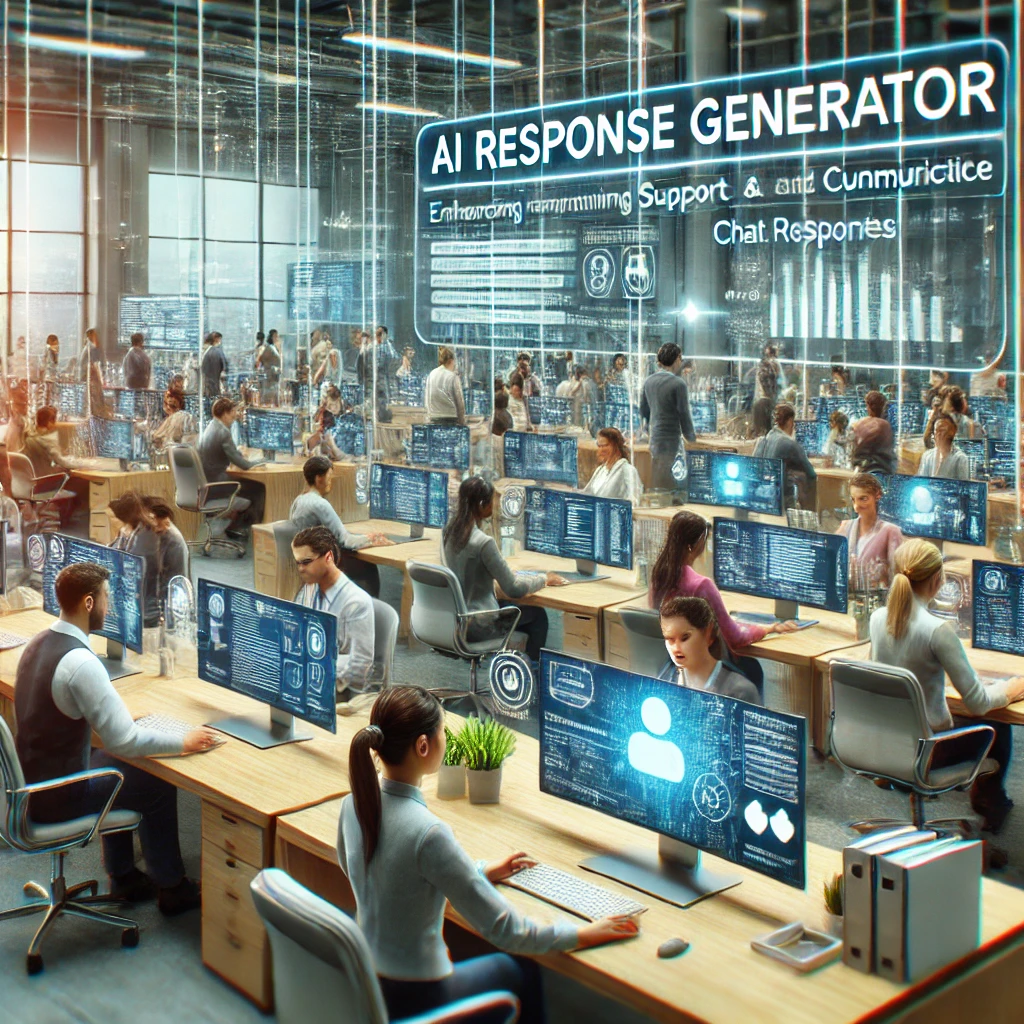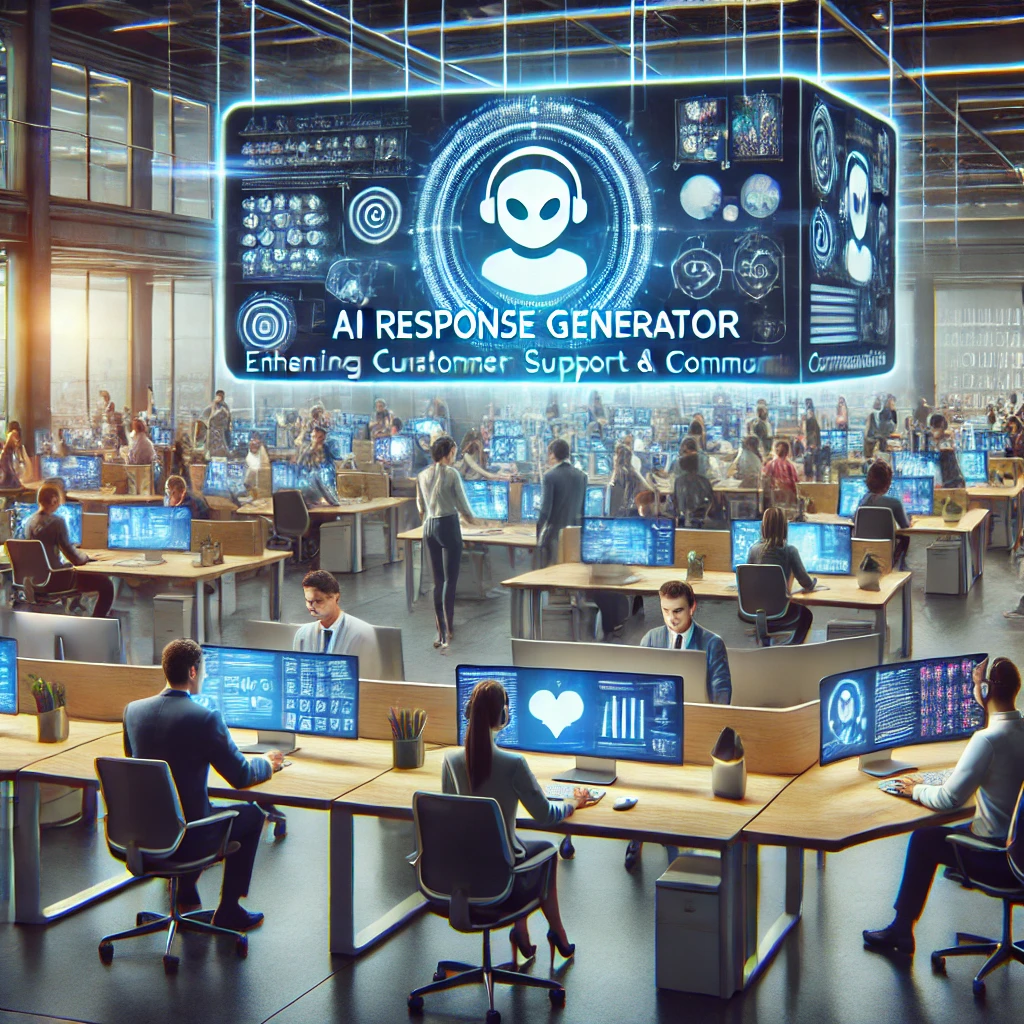
In today’s fast-paced digital landscape, businesses and individuals are increasingly relying on AI to improve communication and streamline customer support. AI response generators have emerged as powerful tools that handle vast amounts of queries, provide accurate answers, and enhance the overall user experience. From chatbots to virtual assistants, these AI-powered systems are transforming how we interact with customers and manage communication. This article explores how AI response generators work, their applications, benefits, challenges, and the future of AI in communication.
What Are AI Response Generators?
AI response generators are sophisticated systems designed to understand and respond to user inputs conversationally. Powered by Natural Language Processing (NLP) and machine learning, these tools can generate text that mimics human-like responses, making interactions more efficient and engaging. They are used across various platforms, including customer service chatbots, virtual assistants, and email automation.
How AI Response Generators Work
AI response generators operate using advanced technologies that enable them to process, understand, and respond to user queries. Let’s break down the main components that drive these systems:
- Natural Language Processing (NLP): NLP is a core component of AI response generators, enabling them to interpret and understand user queries. The AI uses complex algorithms to analyze input text, understand its context, and determine the most appropriate response.
- Machine Learning Models: These systems rely on machine learning models like GPT (Generative Pre-trained Transformer) and BERT (Bidirectional Encoder Representations from Transformers) to generate responses. These models are trained on vast datasets, allowing them to learn patterns in language and improve over time.
- Continuous Feedback Loop: AI response generators often include a feedback mechanism where user interactions help refine and improve the accuracy of responses. This constant learning process ensures the AI adapts to new contexts and user preferences.
Popular AI Response Generators
Several AI tools are renowned for their ability to generate high-quality responses and facilitate better communication. Here are some of the most popular ones:
- ChatGPT by OpenAI: A versatile AI tool that can be integrated into websites, apps, and customer service platforms to provide instant, accurate responses to user queries. You can learn more about it here.
- Dialogflow by Google: Designed for building conversational interfaces, Dialogflow is widely used in chatbots, voice assistants, and interactive customer support systems. Check out its features here.
- Microsoft Bot Framework: Microsoft’s platform allows developers to create, deploy, and manage AI bots across multiple channels, enhancing customer communication. Find out more here.
Applications of AI Response Generators
AI response generators are used in various industries to enhance communication and improve customer support. Let’s explore some of their critical applications:
- Customer Service and Support
- AI response generators are extensively used in customer service to automate responses to frequently asked questions, troubleshoot issues, and provide instant support. This reduces wait times and improves customer satisfaction.
- Example: Companies like Zendesk use AI to automate ticket responses and streamline customer interactions.
- Sales and Lead Generation
- In sales, AI can engage potential customers by answering queries, recommending products, and guiding users through purchasing. This automated interaction helps convert leads into sales with minimal human intervention.
- Example: Chatbots on e-commerce sites recommend products based on customer preferences.
- Internal Communication and Collaboration
- AI response generators are also used within organizations to manage internal communication. For instance, they can automate routine responses in internal chats, provide information on company policies, or assist with employee onboarding.
- Example: AI chatbots in Slack answer common HR-related questions for employees.
- Educational Platforms
- Educational institutions and online learning platforms use AI response generators to provide instant feedback to students, answer academic questions, and facilitate learning.
- Example: AI tutors help students understand complex topics or provide quick explanations.
Benefits of AI Response Generators
The use of AI response generators comes with several advantages that enhance both customer and internal communications:
- Efficiency and Speed: AI response generators can handle multiple queries simultaneously, providing instant answers and significantly reducing response times. This efficiency is especially valuable in high-traffic environments.
- Consistency in Responses: Unlike human agents, AI provides consistent responses, ensuring that users receive accurate and standardized information every time they interact with the system.
- 24/7 Availability: AI-powered systems are available around the clock, providing support and answers outside business hours. This continuous availability enhances user experience and builds trust.
- Cost Savings: Automating responses reduces the need for large customer service teams, resulting in significant business cost savings. This allows companies to allocate resources to other critical areas.
- Scalability: AI systems can quickly scale to accommodate growing volumes of queries without additional staffing, making them ideal for businesses of all sizes.
Challenges and Considerations
While AI response generators offer many benefits, there are also challenges and considerations that businesses need to address:
- Accuracy and Context Understanding: While AI has made great strides, it can still struggle with complex or nuanced queries that require deep contextual understanding. This can sometimes result in inaccurate or irrelevant responses.
- Dependence on Data Quality: The performance of AI response generators heavily depends on the quality and diversity of the data they are trained on. Biases in training data can lead to biased or inappropriate responses.
- Security and Privacy: AI systems often handle sensitive information, making data security and user privacy critical considerations. Ensuring compliance with data protection regulations is essential when deploying AI in customer support.
- Maintaining a Human Touch: While AI can handle many tasks, it lacks human agents’ empathy and emotional intelligence. Balancing AI automation with human backing is essential to maintain a personal connection with customers.
Tips for Effective Use of AI Response Generators
To maximize the effectiveness of AI response generators, consider the following best practices:
- Regularly Update and Train the AI: Updating the AI model with new data helps improve its understanding of current trends and user preferences, enhancing response accuracy.
- Implement Feedback Mechanisms: Allow users to provide feedback on AI responses. This helps identify areas where the AI needs improvement and ensures the system evolves based on real-world interactions.
- Integrate with Human Support: For complex issues, ensure there’s an easy handoff process from AI to human agents. This ensures that customers receive the best possible service when AI reaches its limitations.
- Monitor for Biases: Regularly audit AI models to identify and correct biases. This helps maintain fairness and accuracy in all interactions.
- Enhance Security Protocols: Implement robust security measures to protect user data and comply with privacy regulations. Secure AI systems are crucial, especially when handling sensitive customer information.
The Future of AI Response Generators
The future of AI response generators looks promising, with advancements in NLP and machine learning driving continuous improvements. Future developments may include better emotional intelligence, allowing AI to detect and respond to users’ emotional states. Integrating AI with augmented reality (AR) and virtual reality (VR) could also create more immersive customer service experiences.
Moreover, we can expect more accurate and context-aware responses as AI models become more refined, making them even more reliable. The push towards ethical AI development will also ensure that response generators are fair, transparent, and trustworthy.
Conclusion
AI response generators are revolutionizing how businesses manage customer interactions and communication. By providing instant, accurate, and consistent responses, these tools enhance user experience and streamline operations. As AI technology evolves, response generators will become even more integral to customer service, sales, education, and beyond, offering a glimpse into the future of automated communication.
External Resources and Tools
- ChatGPT by OpenAI: A versatile AI response generator for enhancing customer support and communication. Learn more.
- Dialogflow by Google: Build conversational interfaces for customer support, chatbots, and more. Explore here.
- Microsoft Bot Framework: Develop AI-powered bots for communication across various channels. Find out more.


Thanks for sharing. I read many of your blog posts, cool, your blog is very good.